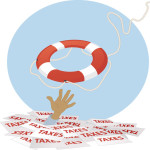After your bankruptcy, one of the hardest questions is figuring out just which debts were discharged.
Eliminating debts was the whole point of filing bankruptcy. You’ve got a court order, but no list.
You and your creditors understandably expect to find a single document telling them what debts are no longer enforceable and which survive the bankruptcy.
No such luck.
Bankruptcy discharge order
The official form used by most bankruptcy courts merely states that the debtor is granted a discharge. The general information on the second page of the form suggests that you might need an attorney to understand the application of the discharge in a particular case.
That’s because, while the bankruptcy schedules require you to list all of your debts, not all of your debts are dischargeable.
Some debts automatically survive the bankruptcy filing. Survivors include family support, recent taxes, and criminal restitution.
Other debts may be non dischargeable if the creditor challenges the dischargeability of its debt and wins at trial.
Student loans may be discharged only if the person filing bankruptcy brings an adversary proceeding to establish that repayment creates an undue hardship.
And then, liens generally survive as a charge on the debtor’s property but not a personal liability.
So, it’s complicated.
And the court doesn’t work out all the intricacies before issuing the discharge order.
Who was included in bankruptcy
The basic rule about discharging debts provides that debts are discharged unless there is a statutory exception to discharge listed in the Bankruptcy Code.
The concept of due process (and a provision of the Bankruptcy Code) says creditors get their debt discharged only if they get notice of the bankruptcy.
That’s why saving your bankruptcy papers is so on point. The schedules and the mailing matrix in your case (and any amendments to them) show who was listed in your case.
Listed creditors are most likely discharged.
Californians get broader discharge
In California, where 9th Circuit decisions are controlling, the Beezley opinion (994 F.2d 1433 1993) tells us that even a creditor who wasn’t listed is discharged in a no asset bankruptcy.
The caveat is that if the creditor has a claim to non dischargeability because of the debtor’s bad acts, the claim survives until the creditor has a chance to challenge the discharge of his debt.
Beezley stands for the proposition that even creditors not listed are discharged in a no asset case.
If everything you owned when you filed bankruptcy was exempt or not worth the trustee’s time to administer, you don’t need to amend your bankruptcy schedules to add creditors that you forgot when you filed. If there are no assets, they didn’t miss anything financial by being omitted.
Other circuits have similar case law, too.
When creditors call after bankruptcy
In this era of debt buyers and zombie debt, most debtors can expect to get a collection letter on a debt that was discharged in their bankruptcy.
Usually what it takes to make a zombie debt collector go away is a copy of the discharge order and a copy of the schedules showing that the original creditor was listed in the bankruptcy.
A creditor who sold off bad debt can’t give the buyer anything more than the seller had; in this case, the creditor had an unenforceable debt.
So, save your bankruptcy documents. If giving the collector a copy of the schedules doesn’t make the creditor go away, contact a bankruptcy lawyer.
The bankruptcy court stands ready to sanction creditors who blow off the discharge order.
Maximize your bankruptcy discharge







[…] What Was Discharged in My Case? […]